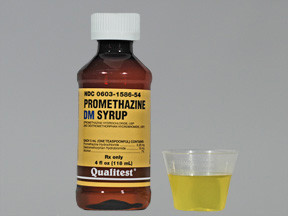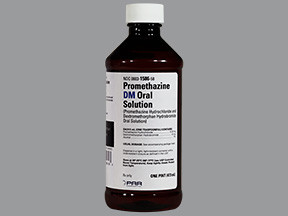PROMETHAZINE/DEXTROMETHORPHAN - ORAL
PHONETIC PRONUNCIATION: (pro-METH-uh-zeen/dex-trow-meth-OR-fan)
GENERIC NAME(S): promethazine HCl/dextromethorphan HBr
Uses
USES: This combination medication is used to temporarily treat runny nose, coughing, and sneezing caused by the common cold, allergies, hay fever, and other breathing illnesses. Promethazine is a phenothiazine that works like an antihistamine. It blocks the effects of a certain natural substance (histamine), which causes allergy symptoms. It also has a drying effect. Dextromethorphan belongs to a class of drugs known as cough suppressants. It acts on a part of the brain (cough center) to reduce the need to cough. This product is usually not used for ongoing cough from smoking or long-term breathing problems (such as chronic bronchitis, emphysema) unless directed by your doctor. Cough-and-cold products have not been shown to be safe or effective in children younger than 6 years. Therefore, do not use this product to treat cold symptoms in children younger than 6 years unless specifically directed by the doctor. Some products (such as long-acting tablets/capsules) are not recommended for use in children younger than 12 years. Ask your doctor or pharmacist for more details about using your product safely. These products do not cure or shorten the length of the common cold and may cause serious side effects. To decrease the risk for serious side effects, carefully follow all dosage directions. Do not use this product to make a child sleepy. Do not give other cough-and-cold medication that might contain the same or similar ingredients (see also Drug Interactions section). Ask the doctor or pharmacist about other ways to relieve cough and cold symptoms (such as drinking enough fluids, using a humidifier or saline nose drops/spray).
How to use PROMETHAZINE/DEXTROMETHORPHAN - ORAL
HOW TO USE: Take this medication by mouth as directed by your doctor, with or without food, usually every 4-6 hours as needed. Since dosing recommendations may vary, carefully follow your doctor's directions for taking this medication. The dosage is based on your age, medical condition, and response to treatment. Carefully measure the dose using a special measuring device/spoon. Do not use a household spoon because you may not get the correct dose. Drink plenty of fluids while you are using this medication unless otherwise directed by your doctor. The fluid will help loosen the mucus in your lungs. Improper use of this medication (abuse) may result in serious harm (such as brain damage, seizure, death). Do not increase your dose, take it more frequently, or use it for a longer time than directed. Tell your doctor if your cough persists, returns, or worsens after 7 days or if it is accompanied by fever, severe sore throat, rash, or persistent headache.
Side Effects
Precautions
Interactions
Overdose
Images
Reviews
Faq for PROMETHAZINE/DEXTROMETHORPHAN - ORAL
- Promethazine/dextromethorphan oral is used to treat symptoms such as cough, runny nose, sneezing, and itchy or watery eyes caused by common cold or allergies.
- Common side effects include drowsiness, dizziness, blurred vision, dry mouth, constipation, and stomach upset. Serious side effects may include difficulty urinating, irregular heartbeat, mood changes, and allergic reactions. Seek medical attention if you experience any severe or unusual symptoms.
- Follow the instructions provided by your doctor or pharmacist. This medication is usually taken by mouth with or without food, usually every 4 to 6 hours as needed. Do not exceed the recommended dosage. It is important to measure the liquid form of this medication with a special measuring device/spoon to ensure accurate dosing.
- This medication may be used in children above the age of six. However, it is important to consult a healthcare professional for appropriate dosing instructions and to determine if this medication is suitable for your child.
- Promethazine/dextromethorphan oral may interact with other medications such as sedatives, tranquilizers, anti-anxiety drugs, antihistamines, muscle relaxants, and certain antidepressants. Inform your doctor or pharmacist of all the medications you are currently taking to avoid any potential drug interactions.
- It is important to discuss the risks and benefits with your doctor before using this medication during pregnancy or breastfeeding. Promethazine may pass into breast milk and may have undesirable effects on a nursing infant.
Warning
WARNING: Promethazine should not be used in children younger than 2 years since it might cause serious (possibly fatal) slow/shallow breathing. This problem has occurred even with normal doses in this age group. The lowest effective dosage should be used, and other drugs that affect breathing should be avoided. Seek immediate medical attention in the unlikely event that slow/shallow breathing occurs. Promethazine should not be used in children with liver disease (including possible Reyes syndrome).
Disclaimer
IMPORTANT: HOW TO USE THIS INFORMATION: This is a summary and does NOT have all possible information about this product. This information does not assure that this product is safe, effective, or appropriate for you. This information is not individual medical advice and does not substitute for the advice of your health care professional. Always ask your health care professional for complete information about this product and your specific health needs.


No Reviews Yet